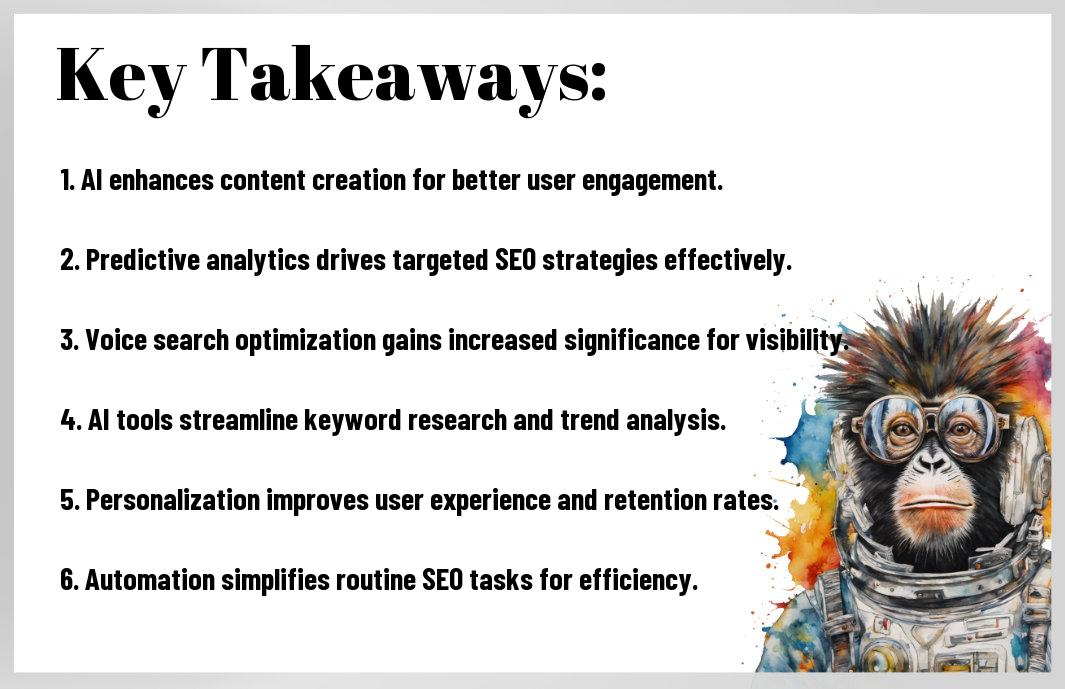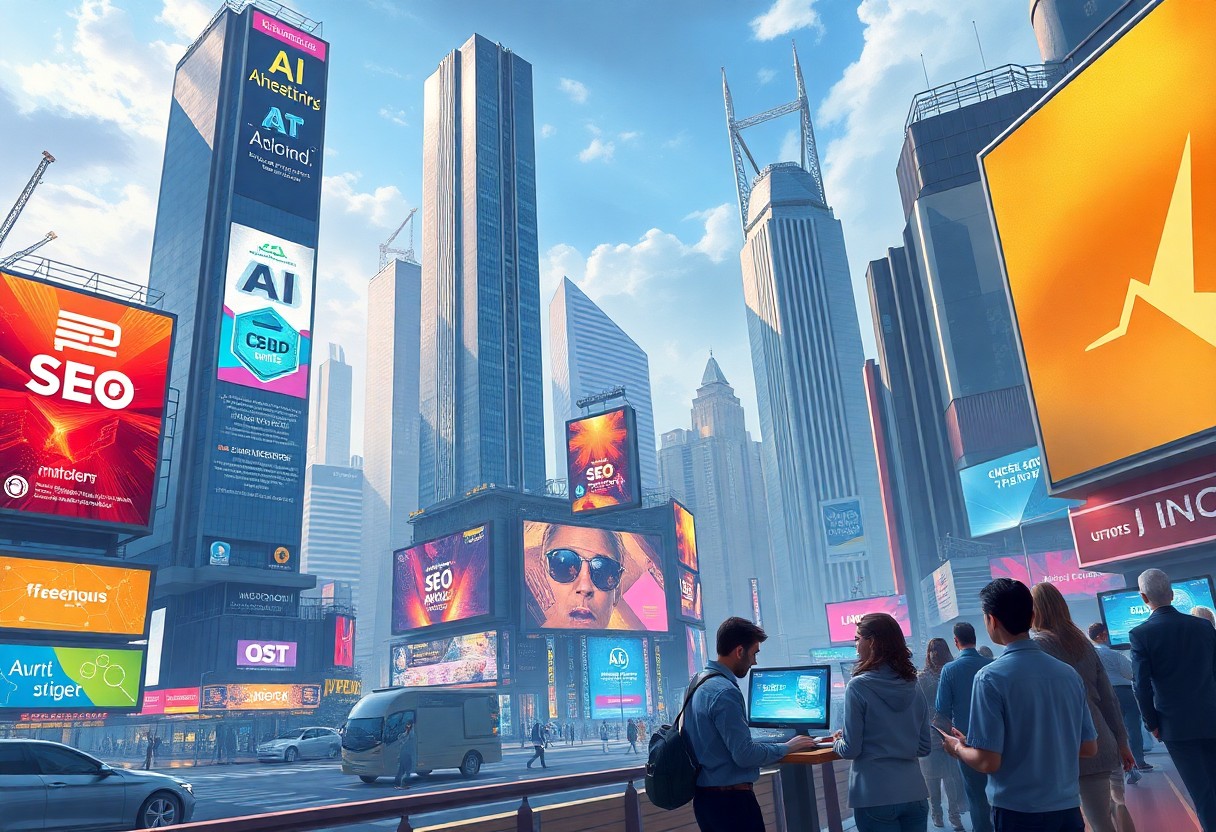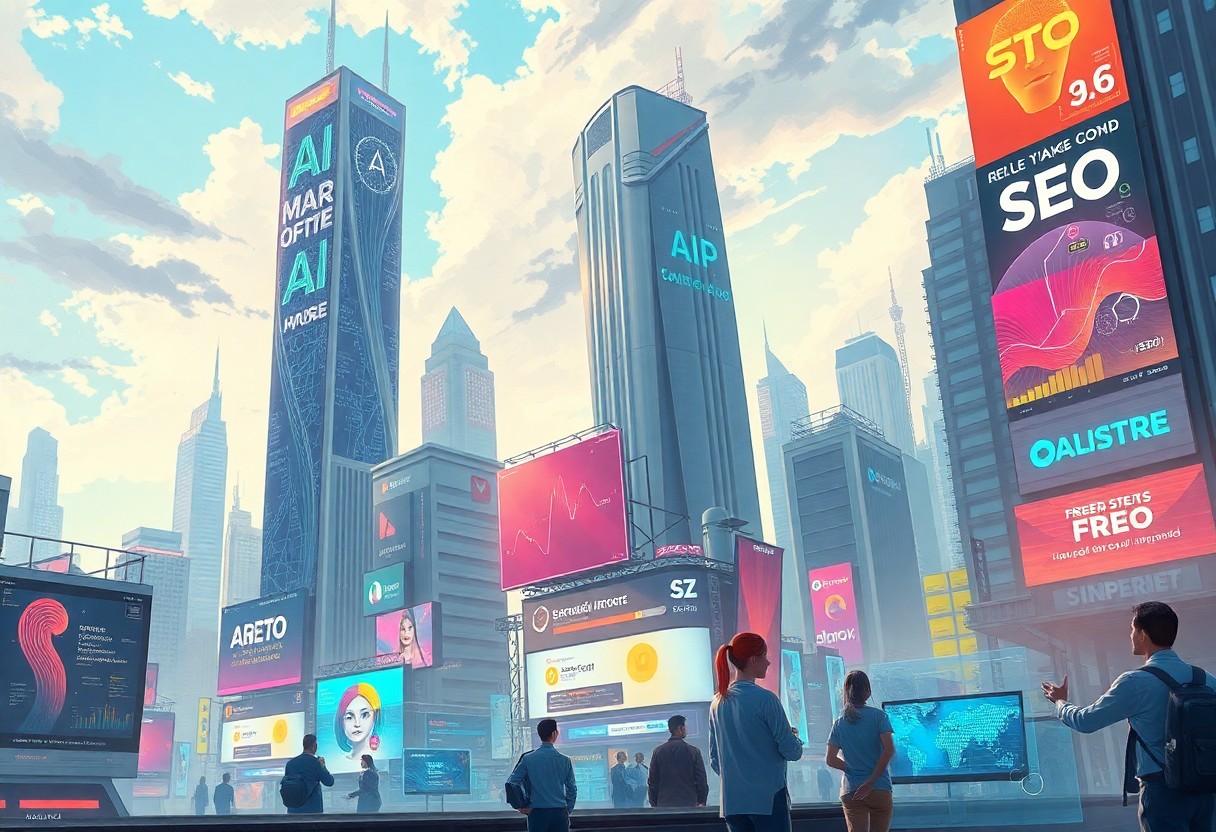Priority on AI-driven SEO strategies is rapidly emerging as a game changer in the digital marketing landscape by 2025. He believes that businesses need to leverage artificial intelligence to enhance their search engine optimization to stay ahead of the competition. She emphasizes that understanding these technologies is not just an asset but a requirement to prevent being left behind. They recognize that adapting to AI SEO will allow companies to maximize their online visibility and target the right audience more efficiently, making it a positive force in digital marketing evolution.
Key Takeaways:
- AI algorithms are increasingly integrated into search engines, making it vital for businesses to adapt their SEO strategies to align with these advancements.
- Content personalization driven by AI is gaining importance, as tailored experiences can enhance user engagement and improve search ranking.
- Voice search optimization is becoming a priority, driven by the rise of smart speakers and voice-activated devices, requiring businesses to rethink their keyword strategies.
- Data analysis and predictive modeling using AI tools are allowing marketers to identify trends and adjust their SEO tactics proactively.
- AI-powered tools are streamlining SEO processes, enabling companies to improve efficiency in keyword research, content creation, and performance tracking.


The Rise of AI in Digital Marketing
While digital marketing continues to evolve, the rise of AI is reshaping the landscape in remarkable ways. Businesses are increasingly utilizing AI tools to analyze vast amounts of data, automate processes, and enhance customer experiences. As companies realize the potential of AI in driving better marketing strategies, they are placing greater emphasis on its integration into SEO practices, positioning themselves competitively for the future.
Understanding AI’s Role in SEO
Against the backdrop of traditional SEO practices, AI brings a new dimension to optimizing online content. It serves as a powerful ally for marketers by providing insights into user behavior and preferences which can be transformed into actionable strategies. As AI algorithms grow more sophisticated, they enable better content creation, keyword targeting, and overall SEO performance.
Key AI Technologies Influencing SEO
For those looking to dominate the SEO game, understanding key AI technologies is imperative. Tools like machine learning, natural language processing, and predictive analytics are fundamentally changing how businesses approach SEO. They allow a data-driven selection of keywords, more personalized content creation, and accurate trend forecasting that can significantly enhance online presence.
It’s necessary for marketers to acknowledge the impact of these technologies in shaping a successful SEO strategy. Machine learning algorithms analyze user data, enabling a deep understanding of search intent while predicting future trends. Likewise, natural language processing is revolutionizing content creation, allowing marketers to craft pieces that resonate with audiences. By incorporating predictive analytics, businesses can make informed decisions and stay ahead of the competition, ultimately leading to an increase in traffic and engagement.
The Changing Landscape of Search Engines
You have to understand that the world of search engines is rapidly evolving. As AI advances, search engines are blending deep learning and machine learning capabilities to optimize search relevancy and deliver personalized results. This shift towards a more intelligent framework is transforming digital marketing strategies, making AI SEO an absolute necessity for brands aiming to stay ahead of the competition.
Algorithm Updates and AI
On a regular basis, search engines implement algorithm updates that integrate AI to enhance their ranking systems. These updates aim to improve how content is understood and categorized, ensuring that users receive the most relevant and engaging search results. Marketers must be agile, adapting to these changes to maintain visibility.
User Experience and AI Integration
Engines are increasingly focused on enhancing user experience through AI integration. By utilizing AI-driven insights, they analyze user behavior to provide more tailored content recommendations, resulting in higher engagement and satisfaction.
Consequently, this focus on user experience is a game changer for businesses and content creators. AI tools can now dissect user interactions, revealing patterns that lead to more effective content strategies. They help identify what users truly want and how they search, creating opportunities for brands to tap into personas and niches. This connection increases brand loyalty and outreach, driving traffic and improving the bottom line. Marketers who leverage these insights are positioning themselves for sustainable growth in an increasingly AI-driven landscape.
The Importance of Content Optimization
Your brand’s online success heavily depends on effective content optimization. As AI continues to evolve, he or she must prioritize creating high-quality, engaging content that resonates with their target audience. They need to fine-tune their SEO strategies to ensure their content ranks well on search engines, ultimately driving organic traffic and increasing brand visibility.
AI-Powered Content Creation
To harness the power of AI in content creation, they must explore tools that help generate tailored content that aligns with audience interests. By leveraging AI algorithms, they can produce compelling articles, engaging social media posts, and informative blogs that captivate readers and build brand loyalty.
Personalization Through AI
Between understanding audience preferences and delivering tailored content, AI personalization transforms the marketing landscape. He or she can utilize data-driven insights to craft unique experiences for each user, ensuring that their messaging resonates on a personal level. By adopting AI capabilities, they elevate their content strategy, moving beyond generic approaches.
Consequently, they can significantly enhance user engagement and retention. With AI technology, he or she can analyze user behavior, enabling them to deliver hyper-personalized content that caters to individual needs. This targeted approach results in higher conversion rates and fosters a stronger connection between brands and their audiences. Embracing AI-driven personalization not only enhances the customer experience but also positions the brand as a leader in the marketplace, driving long-term growth and success.
Enhanced Data Analysis and Insights
Not every business recognizes the seismic shift that enhanced data analysis is bringing to SEO priorities in 2025. As AI tech continues to mature, companies that leverage its power can unlock profound insights, driving their marketing strategies and decision-making processes into the future. Those who fail to adapt will be overshadowed by competitors who use AI-driven analytics to create more targeted and impactful campaigns.
Predictive Analytics in SEO
The integration of predictive analytics in SEO is empowering marketers to forecast trends and user behaviors with astonishing accuracy. By harnessing AI, they can identify potential search terms and content topics before they trend, positioning their businesses ahead of the curve. This proactive approach can lead to significant traffic boosts and higher conversions.
Competitor Analysis and AI
Analysis of competitor strategies has never been more streamlined, thanks to AI tools that dissect data rapidly. This enables marketers to gather insights on what competitors are doing right, and where they falter, allowing businesses to adapt their content and strategies accordingly.
Hence, businesses that utilize AI for competitor analysis gain an upper hand in identifying gaps in the market and potential opportunities. They can track competitors’ keyword strategies and discover successful content formats. By examining social media metrics and engagement levels, she believes that they can unveil insights that directly resonate with target audiences. Embracing AI in this aspect not only enhances a company’s strategy but also ensures they remain aggressive and relevant in an ever-changing landscape, capitalizing on notable weaknesses of their adversaries.

The Future of Keyword Research
Keep in mind that the landscape of keyword research is evolving rapidly, with AI leading the charge. Businesses embracing AI-powered tools will gain a competitive edge in identifying search trends. For more insights, check out SEO Is Not Dead: How to Blog for SEO and AI in 2025. Engaging with these technologies is not optional; it is a necessity for staying relevant.
AI-Driven Keyword Strategies
Above all, he understands that AI-driven keyword strategies are setting the stage for innovative approaches in 2025. By leveraging machine learning and data analytics, marketers can uncover high-potential keywords that resonate deeply with their audiences. This means a shift from reactive to proactive strategies, where anticipatory results become the norm.
Long-Tail Keywords in 2025
After recognizing the shift in user intent, she realizes the immense potential of long-tail keywords. By 2025, these phrases will dominate SEO strategies as they reflect a more nuanced understanding of what users truly seek. Companies focusing on these specific queries will find themselves fostering deeper connections with their audience.
AIDriven innovations in long-tail keywords will reshape search landscapes and user experiences. As they become increasingly vital, marketers must harness AI to investigate into specific, contextual keyword strategies. This approach promises to create highly targeted content that not only attracts traffic but also drives user engagement. Focusing on long-tail keywords allows marketers to tap into the subtle nuances of consumer behavior, ensuring they remain ahead in the game.
Summing up
Following this, they recognize that in 2025, AI-driven SEO isn’t just a trend—it’s a game-changer. He sees businesses shifting their focus towards optimizing content through advanced algorithms that understand user intent like never before. She knows that leveraging AI will not only enhance visibility but also deliver authentic connection with audiences. They understand that adapting to this tech-centric landscape is necessary for staying ahead, sparking genuine engagement, and ultimately driving growth in a digital world where competition is fiercer than ever. Embracing AI SEO is not just smart; it’s necessary.
FAQ
Q1: How is AI transforming the SEO landscape by 2025?
A1: By 2025, AI is set to revolutionize SEO through enhanced data analysis, predictive modeling, and personalization. Businesses will be able to leverage machine learning algorithms to better understand user behavior, allowing for tailored content strategies that resonate with target audiences. AI will also assist in automating routine SEO tasks, freeing up time for marketers to focus on creative and strategic initiatives.
Q2: What role does natural language processing (NLP) play in AI SEO?
A2: Natural Language Processing (NLP) will be pivotal in shaping SEO practices by 2025. NLP technologies will enable search engines to better comprehend the context and intent behind user queries. This understanding allows for more accurate search results and helps brands create content that aligns tightly with user intent, fulfilling audiences’ needs more effectively.
Q3: How will AI-driven tools impact keyword research in 2025?
A3: AI-driven tools will redefine keyword research by utilizing advanced algorithms that analyze vast amounts of data and trends in real-time. By 2025, these tools will provide insights into long-tail keywords and latent semantic indexing (LSI) terms, enabling marketers to uncover opportunities that were previously overlooked. This will enhance content optimization strategies and improve organic search visibility.
Q4: Will AI SEO influence content creation, and if so, how?
A4: AI will significantly influence content creation by 2025 through automated content generation and optimization tools. These tools will assist writers by suggesting topics, optimizing for readability and SEO best practices, and even generating drafts based on input parameters. As a result, content creators can produce high-quality, relevant material faster and optimize it for search engines efficiently.
Q5: What implications does AI SEO have for user experience (UX) by 2025?
A5: With AI SEO integrated into digital strategies, user experience (UX) will take center stage. By 2025, algorithms will prioritize sites that deliver meaningful engagement and smooth interactions. AI can analyze user behavior patterns, helping businesses refine their site architecture, page loading speeds, and mobile responsiveness to create an optimal environment for users, ultimately boosting site rankings.
Q6: How will AI impact local SEO strategies by 2025?
A6: AI is expected to enhance local SEO strategies significantly by 2025 by improving the precision of location-based searches. With sophisticated geolocation data analysis, AI tools will help businesses optimize their online presence for hyper-local audiences, providing insights on customer demographics and local search trends, thereby maximizing local visibility and engagement.
Q7: What challenges might businesses face in adopting AI SEO practices as we approach 2025?
A7: As businesses adopt AI SEO strategies in 2025, there may be challenges such as the need for continuous algorithm updates and adjusting to changing AI capabilities. Companies will also need to invest in training staff to effectively use AI tools and interpret data outcomes. Additionally, as competition for AI-optimized rankings intensifies, organizations must consistently innovate and adapt their SEO tactics to maintain relevance in search results.


